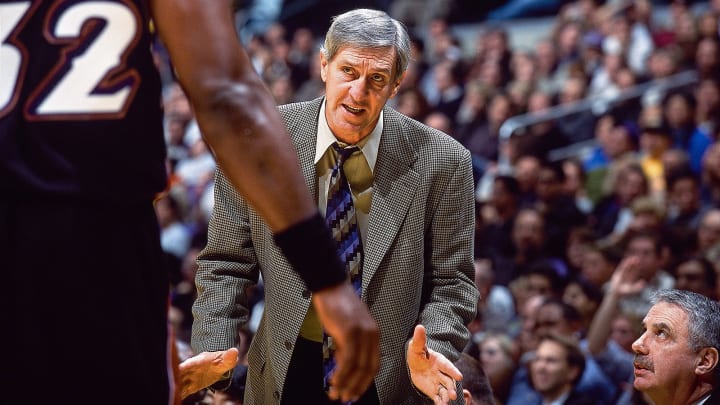Remembering Jerry Sloan: "The Quintessential, Tough Old-Timer"

Over the course of covering the NBA for four decades, certain little things stick with you, and you’re not quite sure why. One of those little things came from John Stockton. Early in 2002, while I worked on a piece about his Utah Jazz coach Jerry Sloan, I asked Stockton, why, at that stage of his Hall of Fame career, he still looked over to the sidelines to get a play call.
“Why wouldn’t I?” answered Stockton.
A perfect Stockton answer. A perfect Utah Jazz answer. And the perfect illustration of the relationship between quarterback and coach, who died on Friday, and, man, it seems like an era died with him. Sloan was 78 and had been suffering for several years with Parkinson’s disease and Lewy body dementia.
Thankfully, for those who never knew of Sloan—a hard-nosed guard with the Chicago Bulls from 1965 to 1976 and system-first coach who led the Jazz from 1988 until 2011—there he was making a brief appearance in The Last Dance, standing at the podium showing deadpan amazement that his high-functioning Jazz had scored but 54 points in Game 3 of the 1997 NBA Finals. “Is this the final?” asks Sloan.
Nobody did deadpan like Sloan. When I would drop in for a few words with Sloan during the 80s and 90s, our conversation would usually go something like this.
Me: How you doing, Jerry?
Sloan: I’m still vertical.
Me: How’s your team?
Sloan: We’re terrible.
Me: Maybe you can’t coach.
Sloan: Hell, everybody knows that.
Me: Thanks, Jerry.
Sloan: For what?
He did open up for that 2002 profile I did on him, mostly because his late wife, Bobbye, had asked him to do it. He admitted that for years he had been hard to live with, moody and uncommunicative. He drank too much, he smoked too much, he stayed in bars for way too long and he made his conversations with his wife and those who loved him way too short. In many ways he was the quintessential, tough old-timer. I can’t believe I’ve gone this far into Sloan’s obituary without using the phrase “old school,” but there it is.
But things changed in 1998 when Bobbye, his high school sweetheart in McLeansboro, Ill., underwent a mastectomy. Sloan stopped drinking and stopped smoking, and their marriage was a happy one until Bobbye, whose outgoing personality was the exact opposite of her husband’s, lost her battle with cancer in 2004. Sloan remarried in 2006 to Tammy Jessop, who survives him.
And don’t go too far with the Jerry-as-nothing-but-an-old-conservative dog story line. Yes, he was born in a hardscrabble rural area outside of McLeansboro known as Gobbler’s Knob (you can’t make that up); he wore a John Deere hat around most of the time; and his hobbies included fiddling around with ancient tractors. (The mind reels at the thought of well-coiffed current Jazz coach Quin Snyder doing the same.)
But even as a player Sloan, called by many “The Original Bull,” was much more than a hard-boned defensive stopper who is remembered for squaring off against Wilt Chamberlain—he had an offensive skill set and averaged 14 points for his career. And, sure, if the Jazz offense was predictable with its rib-rattling pick-setting and its Stockton-to-Malone automation—“meat and potatoes basketball” the late Flip Saunders once admiringly called it when he was coaching the Minnesota Timberwolves—it was also effective. “Best offensive system I’ve ever coached against,” Pat Riley once said.
No, Sloan never won a championship, either as a player—his Bulls were that generation’s version of the Best Team Never To Win It All—or a coach. But in virtually every season that he was on the bench the Jazz were almost always in the picture, something that was never easy for a small-market team, even back in the 80s. In 2009-10, Sloan’s last complete season as coach? The Jazz went 53-29.
His legacy as a coach will not be that he was a brilliant innovator or took the game in a different direction. But can I call constancy and loyalty worthwhile achievements, something to be remembered for, something that got Jerry Sloan into the Hall of Fame in 2009? Let Stockton take it. “Why wouldn’t I?’
